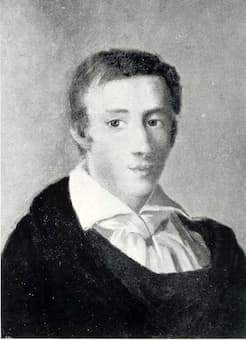
Frédéric Chopin, 1829
In my opinion, Frédéric Chopin was one of the greatest pianists the world has ever known. One of his students writes, “Chopin’s playing was always noble and beautiful; his tones sang, whether in full forte or softest piano…He demanded the strictest adherence to rhythm. He hated all lingering and dragging, misplaced rubatos, as well as exaggerated ritardandos.” And we are indeed fortunate that he left us some of the finest music ever written for the piano. More so than any other composer of his day, Frédéric Chopin went on a journey of infinite discovery. “He combined a gift for melody, and adventurous harmonic sense, and intuitive and inventive understanding of formal design and a brilliant piano technique to ever expand the limits and expressive possibilities of the instrument.”
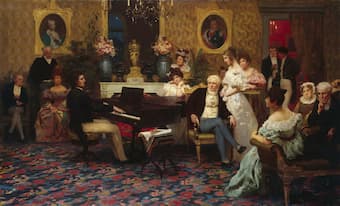
Henryk Siemiradzki: Chopin concert
With his romantic intensity strongly reflected in his music, Chopin is often called the “poet of the piano.” That particular moniker seems well chosen, but it does not really address the composer’s curious and complex status in contemporary culture. A Pole working among Frenchmen, he exuded exoticism even as he partook of European tradition. “He was a male composer who wrote in feminine genres like the nocturne for domestic settings such as the salon.” His music is sublimely poetic, yet we might also hear it “within the construct of his somewhat marginal sexual identity.” In this blog, we will look at bit closer at Frédéric Chopin’s formative years.
Frédéric Chopin: Nocturne in B-flat minor, Op. 9, No. 1 (Samson François, piano)
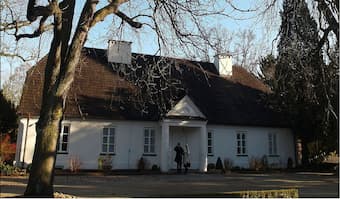
Manor-house in Zelazowa Wola – the Birthplace of Chopin
Frédéric Chopin apparently started life with a bit of a mystery. We know that he was born in Żelazowa Wola, a village west of Warsaw in the Duchy of Warsaw. The baptismal record gives his birthday as 22 February 1810, and cites his given names in the Latin form “Fridericus Franciscus.” When Chopin formally accepted membership in the Polish Literary Society of Paris in 1833, however, he gave his birth date as 1 March 1810. In addition, his family has always used the birthdate 1 March. So what gives in this story? It is now believed that “a mistake of exactly one week was made when his birth was recorded in the register and that it was actually on 1 March 1810, the date accepted today.”
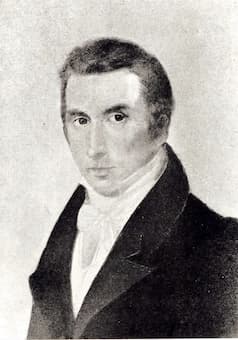
Mikołaj Chopin, Chopin’s father
Frédéric Chopin was the second of four children born to Mikołaj Chopin and Tekla Justyna Krzyżanowska. His father was of French origin, with his family ancestry originating from the area of Lorraine. He immigrated to Poland in 1787 at the age of sixteen, and was employed by Countess Justyna Skarbek as a tutor for her son. Chopin’s mother had been sent to the Skarbeks while she was still a girl. She was a distant and poor relative and worked as a companion and housekeeper for Countess Justyna. The couple married in 1806, and Chopin was baptized in the same church where his parents had married. His eighteen-year-old godfather, for whom he was named, was Fryderyk Skarbek, a student of his father’s. When Frédéric was six months old, the family moved to Warsaw because his father had managed to secure a post teaching French at the recently established Warsaw Lyceum, then housed in the Saxon palace. The Chopin family lived in an apartment in the right wing of the palace for over six years.
Chopin: Introduction & Polonaise Brillante, Op. 3
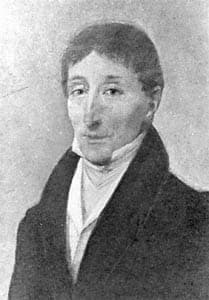
Czech pianist Wojciech Żywny
Chopin’s father played the flute and the violin, and his mother played the piano and gave private lessons. It is probable that young Chopin received his first piano instruction from his mother, but between 1816 and 1821 he took his first professional lessons from the Czech pianist Wojciech Żywny, who had come to Poland during the reign of Stanisław August Poniatowski, the last Polish king. He became the music tutor to the children of Princess Sapieha, and was a close friend of the Chopin family. Chopin played duets with his elder sister Ludwika, and it was quickly apparent that he was a gifted prodigy, “a second Mozart.” Reports on Żywny’s teaching are somewhat mixed, but he instilled a lasting love of Bach and Mozart into his young charge. At some point Żywny probably realized that his most gifted student needed to move on. Chopin in turn thanked him by dedicating a Polonaise in A-flat major to his teacher.
Frédéric Chopin: Polonaise in A-flat major (Idil Biret, piano)
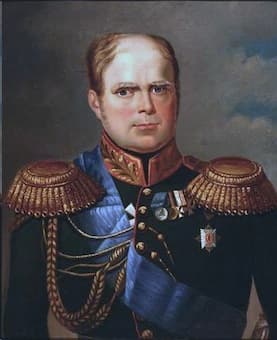
Grand Duke Konstantin Pavlovich of Russia
Frédéric Chopin mingled with a small group of aristocratic families, and he began to participate regularly in salon performances at the Belvedere Palace. He was playmate with the son of the highly unpopular ruler of Russian Poland, Grand Duke Konstantin Pavlovich of Russia. He also made occasional public appearances, and by 1817 he was a published composer. The Warsaw press wrote, “The composer of this Polish dance, a young lad barely eight years old, is a true musical genius.” These earliest compositions “clearly show the influence of the brilliant style of public pianism associated with composers such as Hummel, Weber, Moscheles, and Kalkbrenner.” And without doubt, the “keyboard polonaise reigned supreme in the salons of early 19th-century Poland. Chopin’s early brilliant polonaises, which have little in common with the later heroic works composed in Paris, indicate that in a very short period of time he managed to assimilate many of the standard materials of bravura pianism.”
Chopin: Andante Spianato and Grande Polonaise Brillante in E flat major Op. 22
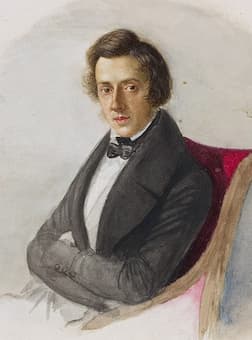
Frédéric Chopin
Frédéric Chopin was probably no older than 14 when he set to work on a set of variations for piano and flute. Already in love with opera, he decided on the happy-ending aria, “Non più mesta” (No longer sad) from Rossini’s opera Cinderella. We are unsure what actually prompted Chopin to select the unique combination of flute and piano, but it was most likely written for his father. In the end, the piece was probably dedicated to Józef Cichowski, a close friend of his fathers and an amateur flutist as well. We are very lucky that this early piece of Chopin juvenilia has actually survived, as Jozef Nowakowski, one of the composer’s friends, kept the single manuscript copy as a memento. It was passed on through generations and first printed only in 1953. This charming and fluent set of variations presents the theme and four decorated versions of the original tune, with all interesting musical moments given to the flute.
Chopin: Variations on a Theme by Rossini
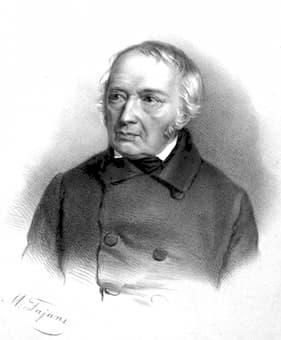
Silesian composer Józef Elsner
The Chopin family was reasonably well connected, and a staunchly middle-class household, “committed to a sound education, a well-developed sense of morality and an ethos of self-improvement.” Frédéric Chopin attended the Warsaw Lyceum between 1823 and 1826 and he received organ lessons from the Czech musician Wilhelm Würfel during his first year. It is also likely that Chopin had private lessons with the Silesian composer Józef Elsner, studying music theory, figured bass, and composition. Elsner started his students on composing polonaises, and then to move through independent rondos and variations sets to sonatas. Elsner advocated “a radical reworking of forms, procedures and materials drawn from earlier masters, especially from the Viennese Classical composer and Bach.” Scholar suggest that Chopin carried Elsner’s “formal and tonal principals through into his mature music, where it changed in radical ways the underlying plot of sonatas and sonata-influenced works such as ballades.
Chopin: Piano Sonata No. 1, Op. 4
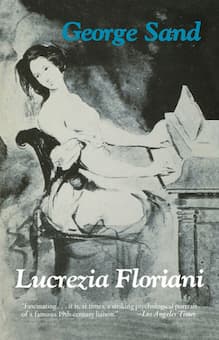
George Sand: Lucrezia Floriani
Concurrently, Frédéric Chopin continued to perform in concerts and the salons in Warsaw. On 10 June 1825, he performed his Rondo Op. 1. It was the first of his works to be commercially published and earned him his first mention in the foreign press, with the Leipzig Allgemeine Musikalische Zeitung praising the work for its “wealth of musical ideas.” George Sand imaginatively describes Chopin’s character at this time in her novel Lucrezia Floriani. “Gentle, sensitive, and very lovely, at fifteen years of age he united the charms of adolescence with the gravity of a more mature age. He was delicate both in body and in mind. Through the want of muscular development he retained a peculiar beauty, an exceptional physiognomy, which had, if we may venture so to speak, neither age nor sex… It was more like the ideal creations with which the poetry of the middle ages adorned the Christian temples: a beautiful angel, with a form pure and slight as a young god of Olympus, with a face like that of a majestic woman filled with a divine sorrow, and as the crown of all, an expression at the same time tender and severe, chaste and impassioned.” It is hardly surprising that Chopin’s music was and still is “commonly viewed as effeminate, androgynous, childish, sickly and ethnically other.”
Chopin: Trio in G minor, Op. 8
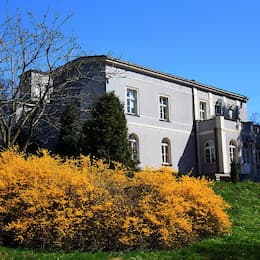
Chopin Centre in Szafarnia
Between 1824 and 1828, Chopin spent his school holidays away from Warsaw. As a guest of his friend and schoolmate Dominik Dziewanowski, he spent the summers of 1824 and 1825 at Szafarnia. This village is situated among the picturesque fields of Dobrzyń land, near the valley of the Drwęca River and Chełmno Lake District. Chopin detailed his visit to the countryside in letters he sent home in the form of a newspaper titled “Szafarnia Courier.” Chopin humorously describes events in the village, and how he was spending his holidays. He writes, “His Lordship Fryderyk Chopin ran races on a courageous horse. He did his mightiest to cross the finish line, and although several times he was unable to overtake Mrs Dziewanowska, who was going on foot (which was not his, but the horse’s fault), he nonetheless achieved a victory over Miss Ludwika, who had gotten already rather near the finish line on foot. His Lordship Franciszek Chopin goes for a ride every day, but with such honours that he always sits in the rear. His Lordship Jakub Chopin drinks six cups of acorn coffee per day, whereas Mikołajek eats four rolls every day, nota bene in addition to a huge dinner and a three-course supper.”
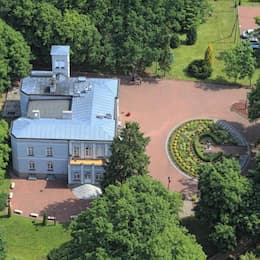
Szafarnia, Poland
It is said that his time in Szafarnia put Frédéric Chopin into direct contact with authentic folk music he heard in and around the village. Apparently, he wrote down some of the songs he heard, and even made music with village musicians. He wrote in a letter dated 26 August 1825, “It was already almost 11 o’clock when Freddie’s wife brought out the cello, which was worse than the fiddle, with only one string. Having grabbed the dusty old bow, as I begin to accompany on the bass, so mightily did I struggle that they all came to see the two Freddies, one playing sleepily on his fiddle, the other sawing away on the one-string, monochord dusty old cello.” Without doubt, the strains of the folk music of the Mazovian plains of central Poland “affected his artistic sensitivity.” Specifically, Chopin seems to have been drawn to “rhythmic and modal patterns, the characteristic melodic intonations and the duda drones of the mazur, kujawiak and oberek.”
Frédéric Chopin: Mazurka No. 46 in C Major, Op. 68, No. 1 (Idil Biret, piano)
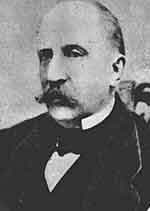
Tytus Woychiechowski
Frédéric Chopin was described as “externally so affectionate, his education had been so finished, and he possessed so much natural grace, that he had the gift of pleasing even where he was not personally known. His exceeding loveliness was immediately prepossessing, the delicacy of his constitution rendered him interesting in the eyes of women, the full yet graceful cultivation of his mind, the sweet and captivating originality of his conversation, gained for him the attention of the most enlightened men. Men less highly cultivated, liked him for his exquisite courtesy of manner. They were so much more pleased with this, because, in their simplicity, they never imagined it was the graceful fulfillment of a duty into which no real sympathy entered.” In 1827, the Chopin family moved from the Warsaw University building to lodgings just across the street from the university. His parents continued running a boarding house for male students, and four “boarders became Chopin’s intimates.” In his letters to Tytus Woyciechowski, Chopin makes “erotic references to dreams and to offered kisses and embraces.” To some commentators, such expression “were common currency in Polish in the spirit of the times,” while other suggest “that they could be perceived as homosexual in nature, but they would not denote more than a passing phase in Chopin’s life.”
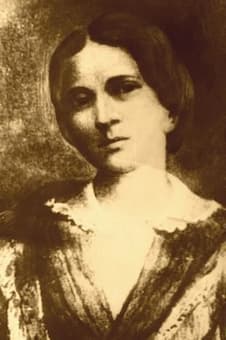
Konstancja Gładkowska
To be sure, Frédéric Chopin developed an intense affection for the singer Konstancja Gładkowska in 1829. Apparently, he never actually communicated his feelings to her, but wrote to Tytus “she is the deal, whom I have served faithfully for six months, though without ever saying a word to her about my feelings; whom I dream of, who inspired the Adagio of my Concert.” As has been written, “the attachment which he felt for this young lady, who never ceased to feel a reverential homage for him… was torn by the tempest which in one of its sudden gusts ripped Chopin from his native soil, like a bird dreamy and abstracted surprised by the storm upon the branches of a foreign tree, sundered the ties of this first love, and robbed the exile of a faithful and devoted wife, as well as disinherited him of a country. He never found the realization of that happiness of which he had once dreamed with her, though he won the glory of which perhaps he had never thought.”
For more of the best in classical music, sign up to our E-Newsletter
Chopin: Piano Concerto No. 2, Op. 21
